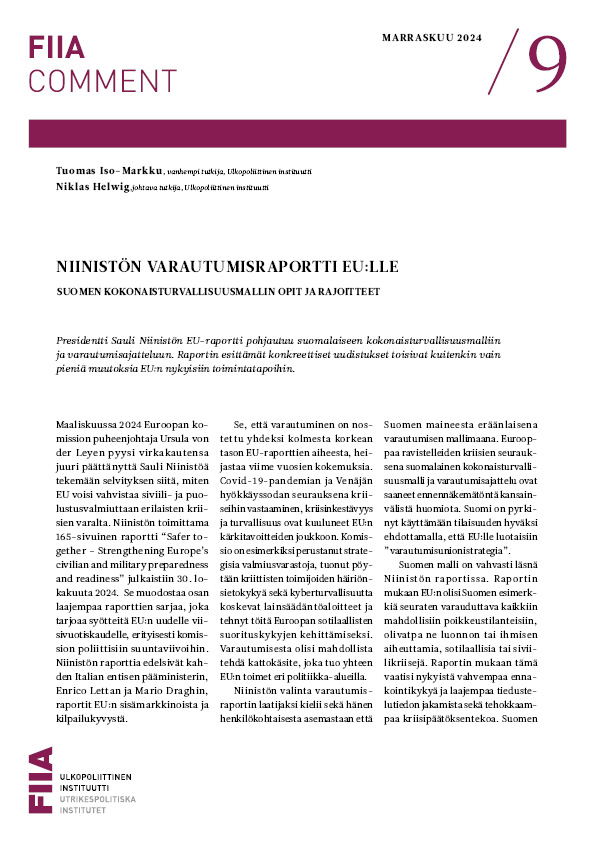Due to the economic crisis and changes in the international system, European foreign services are facing budget cuts and need to re-focus their functions. They should utilize the potential for burden-sharing with the European External Action Service (EEAS) and its network of 141 EU Delegations.
Austerity has taken its toll on the foreign services of most EU member states. In some countries this has meant rather dramatic cuts: for instance Italy cut the administrative budget of its ministry of foreign affairs (MFA) from 991 million euros in 2010 to 919 million in 2012; Greece from 423 million in 2010 to 308 million in 2012; and Estonia (where the crisis hit a bit earlier) from 38 million in 2008 to 32 million in 2011.
Many MFAs, including those in the Netherlands, the Czech Republic and Estonia, have significantly reduced their personnel. In addition to the reductions already made, many member states, for example the Netherlands and Finland, have decided to make more significant budgetary cuts in the foreign policy field in the coming years.
An exception to the trend of decline is Germany, which has slightly increased both the budget and personnel of its foreign service. The two other largest member states, France and the UK, are maintaining an extensive global presence, but have had to cut spending on staff and other administrative costs.
The reductions have often been accompanied by significant re-allocations that also result from the economic crisis and Europe’s relative global decline. As the increase in exports has become a national imperative, foreign policy has been harnessed to boost trade. In some cases, the re-focusing has implied cuts to development assistance, the most drastic example being Spain, which reduced spending on development cooperation from 0.43% of GDP in 2010 to 0.23% in 2012.
The cuts and re-allocations have changed the European networks of diplomatic missions abroad. Many MFAs have closed some embassies and consulates due to financial constraints or are planning to do so in the near future.
In many cases, such as Bulgaria, the Czech Republic, Denmark, Greece, Italy, Latvia and Slovakia, the number of national diplomatic missions has significantly decreased. Finland, too, is closing nine missions in 2011-2013 (while opening some new ones), and about five more missions are expected to face closure in the coming years.
Interestingly, however, many other MFAs have maintained approximately the same number of embassies abroad in spite of the budget cuts. This has to do with the rise of economic diplomacy: most European countries have opened new missions and strengthened their presence in the emerging economies in an effort to promote national economic interests, while cutting their networks in other parts of the world.
Yet, Europe’s global ambition has not been reduced to mere trade promotion. Enhanced competition among European countries for trade opportunities makes it at times more difficult to forge political unity. This has been most visible in China, where most if not all EU member states are strengthening their diplomatic presence, whereas commitment to strengthening common EU policy has been weak.
However, Europe’s relative decline makes more unified global action all the more necessary. In China and elsewhere, the EU is indispensable for ensuring a level playing field for European companies. Beyond trade, the shrinking diplomatic networks of European countries accentuate the need for more burden-sharing.
The European External Action Service, established just over two years ago, should be utilized more by the member states as they seek ways to manage the cuts in national diplomacies. After the opening of a new Delegation in Myanmar, the EEAS has a network of 141 Delegations across the globe, which is exceeded in size only by the foreign services of the five largest member states.
A joint research project by FIIA and the European Policy Centre on ‘The European External Action Service and National Diplomacies’ has found that, so far, no member state has linked the national cuts to the existence of the EEAS. In countries where the diplomatic network has been diminished, the possibilities to compensate for national presence with the work of EU Delegations have not affected the decisions about which embassies should be closed.
However, the member states are starting to show more interest in burden-sharing and ways to tap into the work of the EEAS. Many are interested in the possibility of co-locating embassies with EU Delegations, which reduces practical costs and facilitates coordinated action, as does the placement of national so-called laptop diplomats in EU Delegations (for example, Finland is going to locate a Finnish diplomat in an EU Delegation in Bogota).
Reporting by EU Delegations is also acknowledged as an important added value, especially by smaller member states. Another example of burden-sharing is the strengthening role of the EEAS in crisis coordination in situations such as the conflict in Syria or the tsunami in Japan in 2011.
In mid-2013, High Representative Catherine Ashton is to present a review of the organisation and functioning of the EEAS. As the member states are preparing their contributions for the review, they should take a systematic look at the potential for burden-sharing and added value that the EEAS can offer to the shrinking national diplomatic services.









